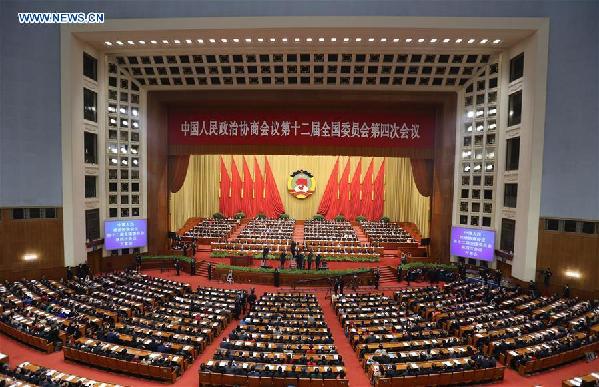Previewing the top economic, social issues planned for annual political sessions
 0 Comment(s)
0 Comment(s) Print
Print E-mail Xinhua, March 4, 2016
E-mail Xinhua, March 4, 2016
|
|
|
The fourth session of the 12th National Committee of the Chinese People's Political Consultative Conference (CPPCC), China's top political advisory body, opens at the Great Hall of the People in Beijing, capital of China, March 3, 2016. [Xinhua/Ding Lin] |
The ongoing political sessions come at a critical time for China, as even in the face of challenges it is edging closer to achieving highly ambitious goals through major reforms.
From early to mid-March, the National People's Congress, the top legislature, and the Chinese People's Political Consultative Conference (CPPCC) National Committee, China's top political advisory body, will be convene their annual sessions, known collectively as the "two sessions."
In about two weeks, nearly 3,000 national legislators representing all regions, the armed forces and other groups and more than 2,200 political advisors from all walks of life will discuss major state policies to be implemented this year and a development roadmap for the next five years.
Economic development, how and in what way China will grow, and military and foreign policies will be some of the heated topics covered by attendees of the two sessions.
Against the backdrop of China's economic transition, the implementation of major reforms, and the ongoing "building of a moderately prosperous society" make the sessions worthy of note.
Premier Li Keqiang will deliver the government work report to the NPC, which will summarize the government's work last year and outline tasks for the year ahead.
The report will normally set the gross domestic product growth rate target, as well as other indices including consumer price index and employment.
China lowered its 2015 economic growth target to "around 7 percent," in what Li told lawmakers in March last year, in the face of "formidable" difficulties.
Official statistics showed that China's economy grew 6.9 percent in 2015 from the previous year. The growth, the slowest pace of expansion in a quarter of a century, was hard won amid a sluggish global recovery.
The lower GDP growth rate is partly due to the fact that China no longer uses it as the leading index to evaluate development. As it undergoes major economic structural reform, China is moving its economy away from the former reliance on major investment projects to one driven by consumer spending.






